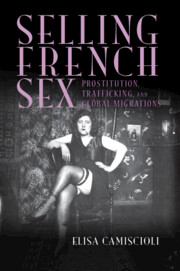‘With a cast of colorful characters - pimps, prostitutes, policemen, consular officials, and more - moving from Paris and other French cities to Havana, Buenos Aires, and throughout the Americas, Elisa Camiscioli links theories of embodiment and melodramas of trafficking to the experiences of women who sought adventure and livelihood by selling sex. Theoretically sophisticated and empirically innovative, this book reconceptualizes the history of prostitution through the history of migration and immigration control to trouble the boundaries between agency and coercion, public and private, work and leisure. A major achievement!’
Eileen Boris - author of Making the Woman Worker: Precarious Labor and the Fight for Global Standards, 1919–2019
‘Elisa Camiscioli’s impressive book is both an essential contribution to French history and a necessary reference in the global history of migration and sex trafficking in the twentieth century. Demonstrating clearly that the simple alternatives of ’coercion’ and ‘agency’ cannot fully encompass the lives of trafficked women, Camiscioli’s book provides a nuanced and humane account of a disturbing and often hidden subject.’
Joshua Cole - University of Michigan
‘A groundbreaking work. Elisa Camiscioli brilliantly imbeds the history of twentieth-century French sex trafficking within the global history of migration, bringing a fresh perspective to both phenomena. Her analysis of the term ‘white slavery’ gives us novel insights into the links between sex and race. Lucidly written and impressively researched, Camiscioli has given us a vibrant transnational history of immigration, women, sexuality, and France.’
Mary Louise Roberts - author of What Soldiers Do: Sex and the American GI in World War II France
‘Camiscioli constructs an intimate history of marginalized young French female migrants under surveillance as victims of ‘trafficking.’ She shrewdly resists assessing their experience according to the stark dichotomies of coercion and consent. Instead, her protagonists appear as vulnerable, yet resourceful migrants driven by economic precarity and propelled by aspirations to upward mobility. This is a deeply researched, brilliantly crafted and ‘human scale’ study.’
Judith R. Walkowitz - Johns Hopkins University



